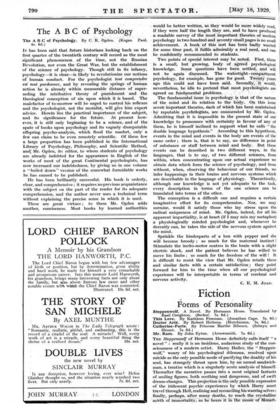The A B C of Psychology
IT has been said that future historians looking back on the first quarter of the twentieth century will record as the most significant phenomenon of the time, not the Russian Revolution, nor even the Great War, but the establishment of the science of psychology. Though still in its infancy, psychology—it is clear—is likely to revolutionize our notions of human conduct. For the psychologist taut compretzdre• est tout pardontzer, and by revealing the springs of human action he is already within measurable distance of super- seding the retributive theory of pimislurient and the theological conception of sin upon which it is based. The malefactor of to-morrow will be urged to control his reflexes and the psychologist, not the moralist, will give Mtn expert advice. Herein lies the practical impOrtance of the subject, and its significance for the future. At present how- ever, it is still only beginning to be a science, and of the spate of books upon psychology and its vaguely disreputable offspring psycho-analysis, which flood the market, only a few can claim to be even remotely scientific. Of these few a large proportion has been published in the International Library of Psychology, Philosophy, and Scientific Method, and', Mr. Ogden, its editor, to whom students of psychology are already indebted for the appearance in English of the works of most of the great Continental psychologists, has now increased our indebtedness, by giving us in one volume a "boiled down" vezsion of the somewhat formidable works he has caused to be published.
He has been brilliantly successful. His book is orderly, clear, and comprehensive ; it requires no previous acquaintance with the subject on the part of the reader for its adequate comprehension, and the author never uses a technical term without explaining the precise sense in which it is used.
These are great virtues ; to them Mr. Ogden adds another, conciseness. Most books by learned authorities
would be better written, as they would be more widely mad, if they were half the length they are, and to have produced a readable survey of the most important theories of modem
• psychology in two hundred and seventy small pages is no small achievement. A book of this sort has been badly wanted for some time past, it fulfils admirably a real need, and can be confidently recommended to students.
• Two points of special interest may be noted. First, there is a small, but growing, body of . 'agreed psychological knowledge. Some questions have been settled, and will not be again discussed. The watertight - compartment psychology, for example, has gone for good. Twenty years ago this could not have been said. Secondly, it would, nevertheless, be idle to pretend that most psychologists are agreed on fundamental problems. , _
The fundamental 'issue in psychology is that of the nature of the mind and its relation to the bikly. On this issue severt important theories, each of which has been maintained by reputable psychologists, are enumerated by Mr. Ogden. Admitting that it is impossible in the present state of our • knowledge to pronounce with certainty in favour of any of them, he is himself inclined to support what he calls "the double language hypothesis." According to this hypothesis, events in the mind and events in the body are events of the same order ; there is, that is to say, no difference in point • of substance or stuff between mind and body. But these events can be described in two different ways, in the languages, that is to say, of two different sciences, from within, when concentrating upon our actual experience we obtain data which form the science of psychology, and from without, when, observing the behaviour of our friends, we infer happenings in their brains and nervous systems which are describable in the language of physiology. Theoretically, although our knowledge is not yet adequate to the task, every description in terms of the one science can be translated into terms of the other.
The conception is a difficult one and requires a certain imaginative effort for its comprehension. Nor, we may surmise, would it satisfy those who lay stress upon the radical uniqueness of mind. Mr. Ogden, indeed, for all his apparent impartiality, is at heart (if I may mix my metaphor) a physiologically minded psychologist and, whenever he decently can, he takes the side of the nervous system against the mind.
Sprinkle the hinderparts of a hen with pepper and she will become broody ; so much for the maternal instinct ! Stimulate the incito-motor centres in the brain with a slight electric shock, and the patient believes he has willed to move his limbs ; so much for the freedom of the will ! It is difficult to resist the view that Mr. Ogden retails these and similar facts with a certain satisfaction.; they point forward for him to the time when all our psychological experience will be interpretable in terms of cerebral and nervous activity.
C. E. M. JoAn.












































 Previous page
Previous page